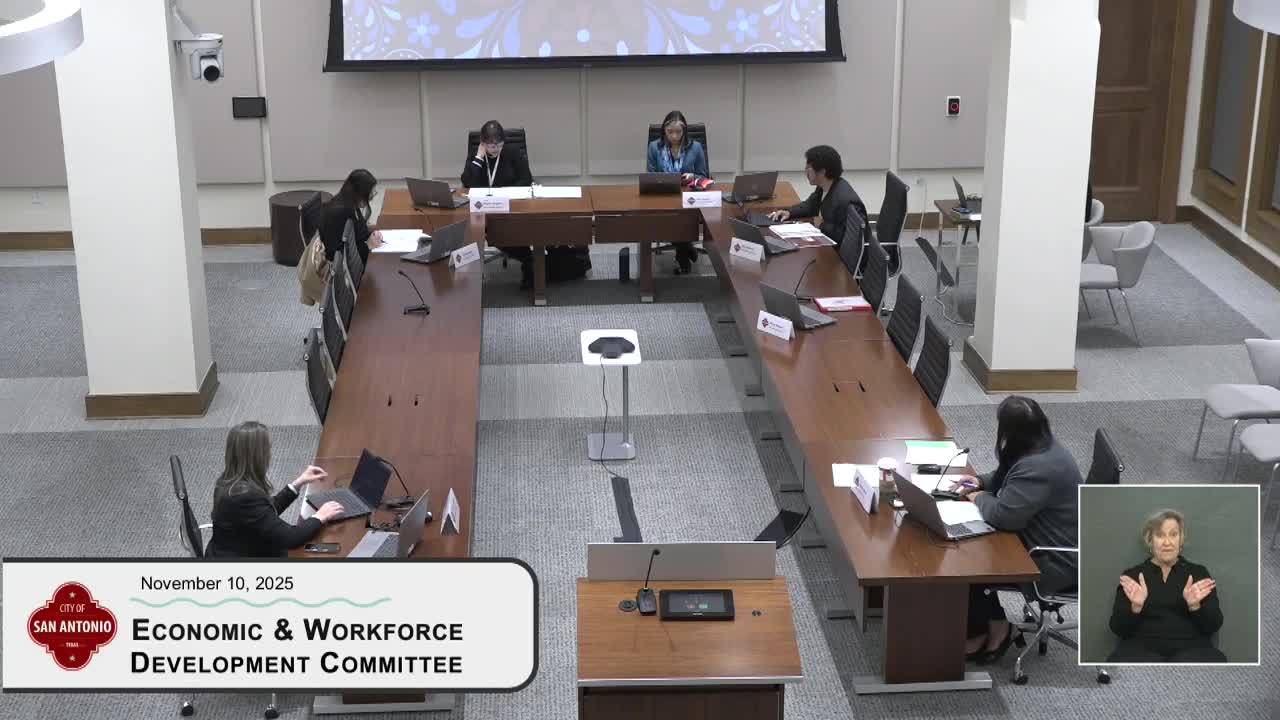San Antonio updates Ready to Work training rules, adds incentives for justice‑involved hires
Get AI-powered insights, summaries, and transcripts
Subscribe
Summary
San Antonio staff told the Economic and Workforce Development Committee on Nov. 10 that the Ready to Work on‑the‑job training (OJT) and incumbent worker training (IWT) pilot has produced early retention and placement outcomes and that the program will expand under FY26 budget proposals.
San Antonio staff told the Economic and Workforce Development Committee on Nov. 10 that the Ready to Work on‑the‑job training (OJT) and incumbent worker training (IWT) pilot has produced early retention and placement outcomes and that the program will expand under FY26 budget proposals.
In a presentation, a staff presenter identified as Mike, staff member with the Economic Development Department, said Round 1 began about two years earlier and, as of Nov. 3, 2025, had served businesses and workers in both OJT and IWT pilots. "Round 1 outcomes" included 6 small and 14 large businesses in OJT (32 and 255 participants, respectively) and 6 small and 5 large businesses in IWT (88 and 231 participants). Mike said retention for OJT (new hires) was about 74% and for IWT (existing employees) about 93%.
Why it matters: the city is proposing rules and budget allocations intended to scale the pilot and tie public dollars more directly to wage gains and job placements. For OJT, staff said the FY26 budget proposes $3 million, a maximum award of $100,000 per business and higher reimbursement rates for small businesses (75%) than for large businesses (50%). Ready to Work trainees could be reimbursed up to $10,000; justice‑involved trainees up to $15,000 to encourage "second chance" hiring, staff said.
Staff described proposed eligibility changes for the next round: OJT employers must be Ready to Work pledge employers, create full‑time jobs with benefits and pay at least $20 per hour for new hires. For IWT the department proposed lowering the pay threshold to $15 per hour so more small businesses can participate. "A lot of our small businesses have a challenge at meeting that $20 an hour threshold," Mike said, explaining the proposed reduction would allow more employers to join and help lower‑wage employees move toward higher pay.
Staff also said the IWT agreements will be written to require a 3% wage increase within the contract term, and that only 50% of training costs will be paid upfront. The second 50% of the award will be paid after city staff verify the wage increase. Mike said that change was made in response to feedback asking the city to ensure employers reinvest training dollars into employees.
Councilmembers pressed staff for more granular data and supports. "I'm grateful to see the incentive to get businesses on board with tapping into this pool," said Councilman Castillo, who also asked whether participants would have wraparound services. Mike replied participants who are Ready to Work enrollees will have access to wraparound supports. Councilmembers asked about district‑ and zip‑code‑level results, industry placements (including AI and advanced manufacturing) and whether training dollars are translating into placements and wage growth. Mike said OJT requires a 100% job placement — the model hires the trainees into permanent roles — and that incumbent worker training is expected to help businesses adopt tools such as AI.
Childcare and single parents: committee members emphasized childcare as a barrier. Staff said Ready to Work can cover childcare costs for participants who are on a state voucher waitlist and that the council had previously authorized a pilot covering those costs. Staff referenced Pre‑K for SA and a local childcare study and said the city will share program and study materials with council members.
Small business outreach: staff acknowledged other barriers for small employers, including tight margins and limited HR capacity, and said the department will deploy employer engagement staff (referenced Joe Morgan) to act as an extension of HR for participating businesses.
Outlook: staff described Round 2 awards (77 employers, $5.9 million to train 2,532 workers) and projected FY26 targets (about 1,200 OJT Ready to Work participants, and separate IWT targets of roughly 350 Ready to Work and 1,000 non‑Ready to Work participants). Staff said they will return with outcome updates as contracts finish.
Ending note: the presentation was a briefing; no formal committee action was taken on program policy during the meeting.
